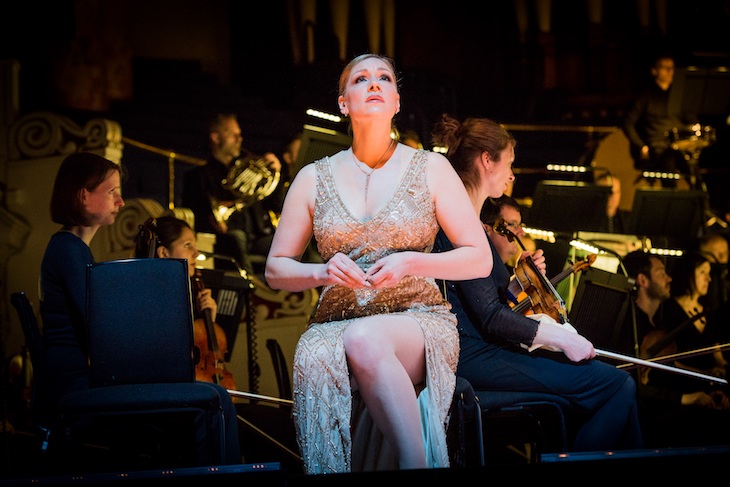Salome is my favourite opera by Richard Strauss, the only one where there is no danger, at any point, of his lapsing into good taste, which there is to some degree in all his other operas, even if only momentarily. With Salome, from the opening quiet clarinet slithering upwards, and the luckless young Syrian Narraboth, later in the work to stab himself to death without anyone noticing, remarking for the first of many times how beautiful the princess Salome is tonight, we know we are in for a mischievous orgy of lust and violence. The work’s chromaticism isn’t used to make particular expressive points but to create and sustain an atmosphere so hot and seedy that we are prepared for anything to happen. And Strauss rewards us always — in as fine a performance as the one we had in Leeds last week — in excess of expectation, however often we might have heard or seen the piece.
As in previous performances by Opera North, we were given a concert performance, the singers going in for a certain amount of gesturing, but without any props. It would add to the fun if they had a marzipan head of Jokanaan for Salome to caress, or at least a nougat tongue for her to suck, but she simply stands austerely and sings her enormous love song with its climactic nonsense about the mystery of love being greater than the mystery of death.
But when the precocious aphorist is as mesmerising as Jennifer Holloway, the absence of gore is hardly felt. This young singer was until recently more inclined to the mezzo repertoire, but her Salome was, if anything, stronger in the upper than the lower register, and she carried off the final scene with such abandoned aplomb that it was tempting to be moved by it as well as enjoyably stunned. While the rest of the cast wore dark evening clothes, Salome looked like a Klimt portrait come to life. The one place where something besides music is urgently required is the Dance of the Seven Veils, and for that Holloway just sat. It’s well known that Strauss left composition of the Dance till last, and the giddy inspiration of the rest of the work completely deserted him, so that anything that can draw attention away from the abysmal quality of the music is required — but clearly not possible in a concert performance.
The cast was uniformly strong, down to the last quarrelling Jew. Robert Hayward was a prophet who sounded even more than usual as if the Wanderer had wandered in from Siegfried. Arnold Bezuyen was a marvellously distraught Herod, and Katarina Karneus, no less, a spiteful but musical Herodias. The young tenor Oliver Johnston made a lot, but not too much, of Narraboth’s misery. The star of the show, of course, along with Salome, is the orchestra and its consummate conductor Sir Richard Armstrong. Opera North’s enlarged orchestra played with detailed intensity, and Armstrong let the players enjoy themselves while saving something up for their staggering final crescendo and the satisfying crunches that conclude the piece as Salome is stamped to death so that we could all enjoy feeling stamped on as well. An unmitigated triumph.
On Monday the Royal Opera Orchestra was given a welcome chance to appear on the stage rather than in the pit. The programme was a strange one, with Christian Gerhaher making two unfamiliar contributions. In the first half he sang Frank Martin’s Six Monologues from Everyman (1949), a striking and austere work that is known, if at all, from Fischer-Dieskau’s typically over-emphatic recording under the composer. Antonio Pappano conducted better than Martin, bringing out the pathos and drama without exaggeration, and Gerhaher was on home territory, which can hardly be said for his second contribution, Eight British and American Folksongs (1943), arranged by Shostakovich, possibly the composer’s least known work. Gerhaher’s English is impeccable, but somehow ‘Blow The Wind Southerly’ and ‘Comin’ Thro’ The Rye’ didn’t seem to contribute to Anglo-Russian relations, their original point, or to be amenable to Gerhaher’s conscientiousness.
The orchestra came into its own in two contrasting works: Richard Strauss’s Metamorphosen, written in 1945 when he was finally made fully aware of what Germany had come to, and in the swirling virtuosity of 23 solo strings giving passionate lament at last, and for the only time achieving profundity. Pappano’s conducting, a steady 25-minute crescendo and collapse, showed him and his string section at their finest. Last came Elgar’s Enigma Variations, a sumptuous performance that lapsed into coarseness only in the finale, when everyone on stage went into overdrive, and in trying to display Elgar’s great heart, which this movement can and should do, tended rather to suggest it was distended. Still, this concert was a welcome and adventurous effort.






Comments